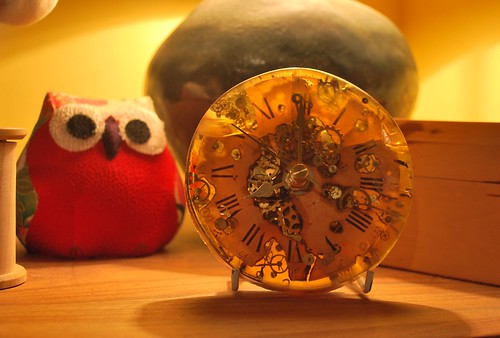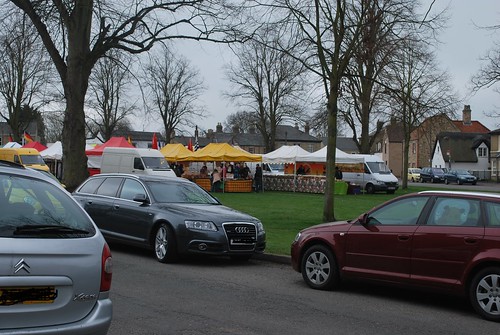Gosh, I'm a long way behind with these. To the extent that the next book up is last month's book club book, and the next discussion happened last night...
The help, by Kathryn Stockett. New York: Berkley, 2009.
This was quite astonishingly good. The comparison with
To Kill a Mockingbird on the cover raised my hackles (any comparison to my favourite novel, in the world, ever, tends to do that); but really, putting that aside, you could see why the analogy was made. I know I'm very late to the party with this one, and everyone in the world has probably read it; but for anyone who hasn't.... The main voices belong to Aibileen and Minny, two black maids, and Miss Skeeter, a white woman just out of college in 1962, with the urge to become a journalist and no real idea of what she wants to write about. After one of her contemporaries starts a crusade to segregate bathrooms in people's private houses so they no longer have to use the same loo as their maids, Skeeter decides that real-life accounts of the lives of maids would be an interesting subject for literature. In this, she entirely fails to understand the danger involved in the enterprise; for her, any suggestion that she sympathises with the civil rights movement leads to social ostracism; for the maids, the danger is much more real and present - Aibileen lives two streets away from Medgar Evers and his family, and Evers' murder features in the story.
I started off with this one with a small measure of dread - Aibileen's account is written in a dialect, which often spells death to my urge to read a book; but it's written well enough that you get caught in very early on and it's just a signal of who's speaking. Aibileen is the real voice of the novel - compassionate, fierce and courageous. None of the characters are caricatures, not even the really rather dreadful Hilly who dominates the Women's League, or Mother, who when she believes she is dying keeps a notebook of Fashion Faux Pas to pass on to Skeeter for Future Reference. There has been some controversy over a white woman writing in a black woman's voice; and maybe my point of view on this shows my ignorance; but what happens if nobody can speak in a voice other than their own? What would a world without
Othello, or
Fahrenheit 451, or
Alice's Adventures in Wonderland, be like? A much longer review than usual, but I laughed out loud and cried tears over this book, sometimes simultaneously; and it'll teach me that just because something's incredibly popular, that doesn't mean I won't enjoy it!
Theodore Boone, kid lawyer by John Grisham. London: Hodder and Stoughton, 2010.
The fact that one copy of this book in the library was in the thriller section and the other in Young Adults is probably just about right. Theodore Boone is thirteen, and spends more time in the local courthouse than most lawyers. His parents are lawyers (and liberals; one of Theo's evenings each week is spent at the local soup kitchen). Most of their friends are lawyers. (Even the family dog is called Judge.) Theo wants to be a lawyer one day, and is already dispensing free legal advice to his classmates. The case of the moment is a spectacular murder, very unusual for the Boones' small town, and Theo finds himself with vital information he doesn't know how to handle, but which proves the accused's guilt much better than the prosecution case can. This is a lovely, engaging book; I think it's Grisham's first foray into YA fiction but I hope not the last. I read it in an afternoon while knitting the stocking-stitch body of a sweater and it's a delightful read.
The American future: a history, by Simon Schama [audiobook]. Read by Peter Marinker. Whitley Bay: Chivers, 2008.
I gather this is a book-of-the-series sort of thing - but as I never saw the series, it stands up very well as an audiobook. Marinker's reading is excellent, as he switches between US and British English pretty seamlessly. The framing device is the 2008 Presidential election campaign, and particularly the Democratic caucuses where there is a genuine choice between a female candidate and a black candidate for the first time. As ever in American history, the future is found to have its roots in colonialism and civil war; and some of the individual stories are fascinating. I think the one I found most interesting was that of the Meigs family, who were around in the colonial era and at the founding of West Point, and who fought in the Civil War, both World Wars, Korea and Vietnam. There's an interview with the current Montgomery C. Meigs (IV? I'd lost track), who's a professor of military history; for a relatively new country, that's a heck of a dynasty. I found this moving, funny and profoundly interesting. I imagine all I'll retain is some flypaper details, as ever, but I'm sure some facts have gone in somewhere!
The retribution, by Val McDermid [audiobook]. Read by Saul Reichlin. Rearsby, Leics: WF Howes, 2011.
This was a characteristically creepy Tony Hill/Carol Jordan book; Jacko Vance, a serial killer Hill and Jordan managed to arrest in their first case together, has escaped from prison and is determined to exact revenge. Vance is an ex-Olympic athlete who turned radio presenter after he lost an arm; and it's a testament to McDermid's skill that you don't just stop reading after that description... Vance is seriously scary and will stop at nothing; and given that we know McDermid doesn't let the fact that a character is well-liked and fairly vital to the plot stop her offing said character if the plot demands it, one or two of the features of this particular book shouldn't surprise or shock; but they do. Reichlin's another narrator I watch out for - his reading of Steig Larsson's
Millennium trilogy added a lot to my enjoyment of them, and he does another excellent job here.
Free fire, by C J Box. Kindle edition.
Joe Pickett again! This time, he's called in to a very strange series of events at Yellowstone National Park, after a letter was sent to the state governor alleging unspecified crimes were taking place. In the same area, a lawyer has been acquitted of three murders on the technicality that a local jury couldn't be empanelled due to there being no local residents in the park. Joe is far from home (although the home he currently has is far from satisfactory) and his family, and the eerie goings on don't help much, either. For some reason, I didn't enjoy this as much as I did previous books; maybe it's the far-from-home thing...







